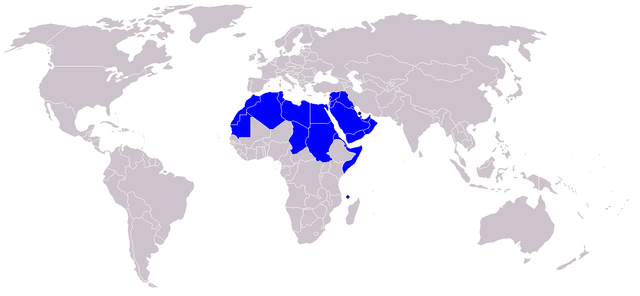the buzz
Arabic is becoming an increasingly popular choice among language learners. More and more schools are offering Arabic and “top ten”-style lists abound online, extolling the reasons why Arabic is the language you should be learning. It has close to 300 million native speakers, it is an official language in 25 different countries, it opens up many lucrative job opportunities, etc. These are the typical reasons given as motivation to learn a language. The media likes to identify the “next big language” or the “language of the future” every now and then, and typically this has more to do with economics and business than anything else. You won’t find articles encouraging the study of Telugu or Javanese (though they each have close to 100 million native speakers) because they just don’t carry financial incentives. We’ve seen it with Spanish and Chinese as well – different languages, same rhetoric. Speakers of large languages are seen as untapped markets, or worse, sources of cheap labour, that become more accessible when you learn to speak their language. Notions of learning about a new culture, connecting with people, and expanding your worldview are all too often glossed over. What matters at the end of the day is the money. And though this type of thinking does a great injustice to the value of learning languages in general, I feel that it falls extremely short of conveying the importance of learning Arabic, particularly in our world today.

the reasons
In the U.S., particularly in the last year, anti-Muslim and anti-Arab rhetoric and acts are on the rise. Escalating after the Paris attacks last year and stoked ever since by Trump’s campaign. Last year, two men were temporarily stopped from boarding a flight from Chicago to Philadelphia because they were speaking Arabic, and it made another passenger “uncomfortable”. A University of Berkeley student was removed from a flight in April for the same reason. Self-defense classes for Muslim women have been started in New York after increasing reports of harassment targeting women wearing hijabs. Most recently, three members of an anti-Muslim, anti-immigrant militia group in Kansas were arrested for planning to bomb an apartment building housing many Somali immigrants. A dangerous culture of fear has grown around Islam in America and anything associated with it.
An article from a right wing news website states that Arabic is the fastest growing language in the U.S., citing a 29% increase between 2010 and 2014. The article warns of the high percentages of people in the U.S. that speak a language other than English at home. These numbers are seen as a threat to the English language itself, which is referred to in the article as the “glue that holds our country together”. This rhetoric feeds the myth of the “Islamization of America”, when in reality this 29% increase only brings the number of Arabic speakers in the U.S. up to about 860,000, or roughly .003% of the population. Not exactly a large enough sector to warrant fear on a national level. Nevertheless, anti-Muslim sentiment in the country grows. A school district was shut down due to threats it received after a homework assignment featured Arabic calligraphy. People are scared of what this language supposedly represents, and despite the fact that many Arabic speakers are not Muslim and many Muslims do not speak Arabic, the Arabic language is perceived as a part of that so-called “threat” of Islam.
With hate speech and fear-based Trumpisms flying around at an alarming rate, it seems to me that the biggest reason to learn Arabic nowadays, is the need to support communities of Arabic speakers. Those who enjoy learning languages are uniquely equipped to help turn the tide of intolerance through the study and use of Arabic (emphasis on the “use”). People tend to fear the unknown, but the linguistically-inclined can help shed light on the Arabic language, and by proxy the people that speak it. One of the “reasons to learn Arabic” lists I came across puts it very clearly:
“By studying Arabic and learning about the culture, you will gain a deeper and more nuanced perspective of the Arabic-speaking world than the typical themes found in U.S. mass media. As you share a more balanced perspective with your family, friends, and peers, you will encourage a greater understanding of Arab culture in U.S. society and more trusting attitudes towards Arab Americans and Arabs living in the U.S.” (American Councils for International Education, Seven reasons why now is the time to learn Arabic)
It’s also important to keep in mind that when practicing your new language skills with Arabic speakers, you’re giving direct support to the language community. You’re allowing the other person to feel pride in their language and identity. You begin to chip away at the dynamic that keeps those who are marginalized from freely and safely displaying their culture, speaking their language, or just being themselves. It’s a small step, indeed, but your efforts won’t go unnoticed.

the language
I personally love to study languages, so needless to say, I have already jumped on the bandwagon and begun to learn Arabic as well. It’s one of the world’s “big languages”, so it was only a matter of time before I got around to studying it. Now, however, it’s also a matter of urgency and importance.
The first decision every student of Arabic will encounter is whether to study Modern Standard Arabic (MSA), the literary language based on the language of the Qur’an, or one of the many regional dialects of Arabic. Benny Lewis, a.k.a. The Irish Polyglot, has a good article hashing out this question on Fluent in 3 Months, so I won’t delve into the pros and cons here. In the end I’ve decided to lean heavily towards dialects and just periodically check in with MSA as I progress. After all, I want to be using and speaking this language out in the world. I’m mainly using audio materials, as the regional dialects are not generally written, and am focusing on Levantine Arabic (because of the political situations in the region) and Egyptian Arabic (because of the vast amount of media available in this dialect). At this early stage, there isn’t much confusion between the two dialects, but I imagine there might be as I progress, at which point I’ll just pick one dialect to focus on.
Worth particular mention are the Pimsleur audio courses available for Eastern (Levantine) Arabic, Egyptian Arabic and Modern Standard Arabic. These courses are pure audio and they get you speaking from the first lesson. I have found that it’s best to supplement with other print materials, but the Pimsleur courses will definitely get you over the initial hurdle of starting to speak. The only drawback is that the Pimsleur courses are quite expensive, though they are often available at libraries.
Another wonderful resource that I have discovered in NaTakallam. This is an online platform that matches up Arabic learners with native Arabic-speaking refugees around the work. The learner gets one-on-one lessons via Skype for $15 per hour (a great rate for private lessons), and the teacher get some much needed income. I found a great Syrian tutor this way, and he has been a valuable resource.
As for Modern Standard Arabic, I decided I would get some very simple workbooks to start to get the basics of the written language. So with Syrian Arabic dialogues playing in my headphones, I walked over to a section of Atlantic Avenue in Brooklyn where there are a couple of Arabic language bookstores.
Maktaba Dar-Us-Salam has a great selection of beginner level books for MSA – I picked up a reader and a few workbooks. Though I was eager to try speaking Arabic in the store, I actually just ended up practicing Urdu with the store clerk. I think this brings up an important point though. Arabic speakers are not the only ones feeling the brunt of anti-Muslim sentiment in the U.S. Learning Bengali or Farsi or Urdu can make just as much of a statement. The key question is what signal do your linguistic pursuits send out to the world around you?
As I left the bookstore I was stopped by a reporter who asked me if I was buying books on Islam and if I was Muslim. She said she was interviewing people to find out about any anti-Muslim behavior experienced in the wake of recent events. It was a nice reminder of my original motivation for coming to this store. It’s easy to get caught up in the excitement of glossy new books and beautiful scripts, but it’s essential to remember that the extremely rewarding study of a language can have far-reaching positive effects with the right intention and practice. If you are a student of Arabic, or if you decide to become one, I hope that you will keep this in mind.
This is an updated version of an article that I wrote last year for my language and linguistics blog Collectanea Linguistica.
good article . am from Algeria my frist language is Arabic if you need any help i'll be glad if you ask . good luck
Downvoting a post can decrease pending rewards and make it less visible. Common reasons:
Submit
Am very happy to find arabic friends here to share our experience in this platform and develop it to reach our goal inshaalah
Downvoting a post can decrease pending rewards and make it less visible. Common reasons:
Submit
thank you!
Downvoting a post can decrease pending rewards and make it less visible. Common reasons:
Submit
Hi Timothy,
Very interesting article about Arabic, i own langauhe school and we teach Arabic for foreigners , we receive a lot of people to learn Arabic from Europe some of them come to support work and to have better chances in gulf or Arab world , but you know .... MOST of them come to understand us as you mentioned .... to know About Arab world from Arab them selves
i liked you article and followed you too
Warm regards,
Downvoting a post can decrease pending rewards and make it less visible. Common reasons:
Submit
Thank you!
Downvoting a post can decrease pending rewards and make it less visible. Common reasons:
Submit
Congratulations @timothymckeon! You have received a personal award!
Click on the badge to view your own Board of Honor on SteemitBoard.
For more information about this award, click here
Downvoting a post can decrease pending rewards and make it less visible. Common reasons:
Submit
Congratulations @timothymckeon! You have completed some achievement on Steemit and have been rewarded with new badge(s) :
Click on any badge to view your own Board of Honor on SteemitBoard.
For more information about SteemitBoard, click here
If you no longer want to receive notifications, reply to this comment with the word
STOPDownvoting a post can decrease pending rewards and make it less visible. Common reasons:
Submit
Congratulations @timothymckeon! You have received a personal award!
Click on the badge to view your Board of Honor.
Do not miss the last post from @steemitboard:
Downvoting a post can decrease pending rewards and make it less visible. Common reasons:
Submit
Congratulations @timothymckeon! You received a personal award!
You can view your badges on your Steem Board and compare to others on the Steem Ranking
Vote for @Steemitboard as a witness to get one more award and increased upvotes!
Downvoting a post can decrease pending rewards and make it less visible. Common reasons:
Submit